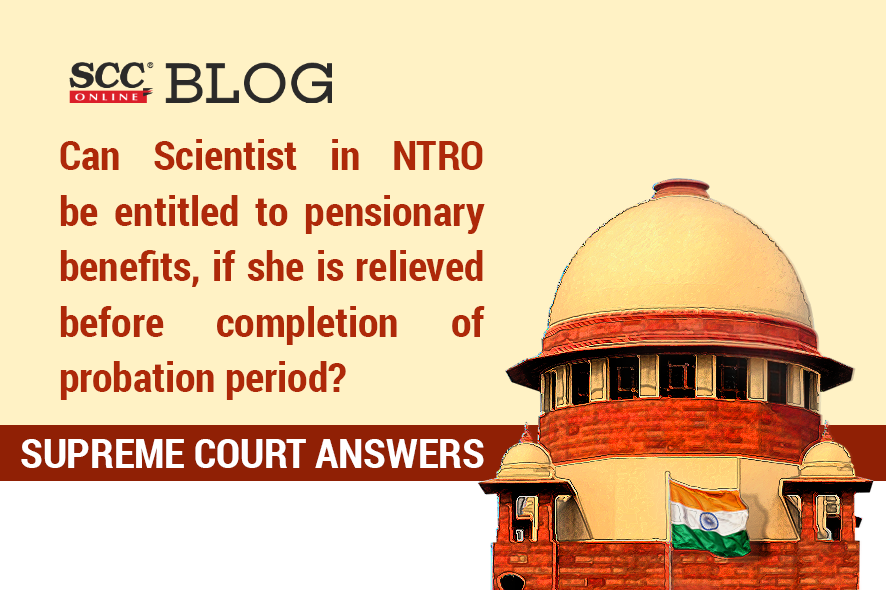Supreme Court: In an appeal filed by the National Technical Research Organisation (‘NTRO’) against the impugned judgment and order passed by Karnataka High Court, wherein, the Court held that the respondent shall be entitled to all consequential benefits including the benefit of past service that she had rendered in Defence Research and Development Organisation (‘DRDO’) for computing her terminal benefits, the division bench of MR Shah* and Hima Kohli, JJ. held that the respondent could not have been given the pensionary benefits / terminal benefits as Scientist -H in NTRO. Further, set aside the impugned judgment and order passed by the High Court and restored the judgment and order passed by the Central Administrative Tribunal (‘CAT’).
In the case at hand, the respondent who was holding the post of Scientist ‘G’ in DRDO, applied for the post of Scientist ‘H’ in NTRO through her parent department, i.e., DRDO. On being selected and appointed in NTRO on direct recruitment basis, the respondent tendered her resignation from the post of Scientist ‘G’ in DRDO, which came to be accepted and DRDO relieved her to take up the new appointment in NTRO. However, while she was on probation’ in NTRO, the Appointments Committee of Cabinet vide order dated 12-02-2019 granted approval for her premature repatriation from the post of Scientist ‘H’ in NTRO to her parent department cadre,DRDO. Respondent’s case was that she was wrongly repatriated prematurely and sent to DRDO as Scientist ‘G’, further her Voluntary Retirement Scheme (‘VRS’) application ought to have been considered as Scientist ‘H’ in DRDO.
By the impugned judgment and order, the High Court has set aside the judgment and order passed by the CAT by observing that once the respondent was appointed as Scientist ‘H’ in NTRO on direct recruitment basis, NTRO could not have repatriated her on a lower post that she originally held in DRDO. The High Court has also observed that the concept of reversion in the case of direct recruitment would not arise and therefore, her repatriation as Scientist ‘G’ to DRDO was illegal.
The Court noted that from 13-02-2019, the respondent can be said to be the employee of DRDO and from 13-02-2019, she cannot be treated to be an employee of the NTRO and said that the High Court has committed a very serious error in issuing the said directions as, more particularly, of treating the communication dated 12-02-2019, as an order of discharge simpliciter. The High Court has also committed a very serious error in ordering that under the order dated 12-02-2019, the services of the respondent shall stand discharged, and she shall be entitled to all consequential benefits including the benefit of the past services that she had rendered in DRDO for computing her terminal benefits. The directions issued by the High Court are self-contradictory.
Further, it said that once, the respondent was relieved from NTRO and had reported for duty as Scientist – G in DRDO, thereafter she cannot be permitted to claim that she had continued working as Scientist – H in NTRO.
The Court also noted that the respondent was appointed as Scientist – H in NTRO as a direct recruit, on probation and her probation period was not completed. Before her probation period was completed, she was relieved. Therefore, even as per the Central Civil Services (Pension) Rules, 1972, she could not have been given the pensionary benefits / terminal benefits as Scientist -H in NTRO.
The Court, in order to do complete justice, directed that the respondent can press the prayer to accept her VRS application, which may be considered by the DRDO positively. However, the same shall be done by the DRDO on the post of Scientist – G.
[National Technical Research Organization v. Dipti Deodhare, 2023 SCC OnLine SC 155, decided on 17-02-2023]]
*Judgment authored by: Justice MR Shah
*Apoorva Goel, Editorial Assistant has reported this brief.







